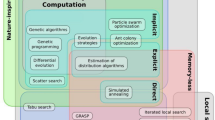Abstract
The high computation requirements of global optimization algorithms, when used to solve real optimization problems, have caused the appearance of different parallelization strategies using several parallel computing architectures. In this work, the Universal Evolutionary Global Optimizer is implemented in CUDA to be run on GPU architectures (GPuEGO). This parallelization of the referred evolutionary multimodal optimization algorithm is rather different from other previous parallel implementations designed to be executed into shared or distributed memory processors. In this case, due to the special characteristics of a GPU architecture, the original data structures are not valid and it has been necessary to redefine them and all the functions that operate with them. When this approach is applied the acceleration factors achieved by GPuEGO range from \({\times }\)6.33 to \({\times }\)23.20 depending on the test function.




Similar content being viewed by others
Notes
J. M. García-Martínez, E. M. Garzón, P. M. Ortigosa Test functions for multi-objective and multi-modal global optimization problems https://sites.google.com/site/gotestfunctions/ (2014).
References
Alba E (2005) Parallel metaheuristics: a new class of algorithms. John Wiley & Sons, Hoboken
Alba E, Luque G, Nesmachnow S (2013) Parallel metaheuristics: recent advances and new trends. Int Trans Oper Res 20:1–48
Brent R (1973) Algorithms for minimization without derivatives. Prentice-Hall, New Jersey
Fok K, Wong T, Wong M (2007) Evolutionary computing on consumer graphics hardware. IEEE Intell Syst 22(2):69–78
Marsaglia G (2003) Xorshift RNGs. J Stat Softw 8(14):1–6
Jelásity M, Dombi J (1998) GAS, a concept on modeling species in genetic algorithms. Artif Intell 99(1):1–19
Jelásity M, Ortigosa PM, García I (2001) UEGO, an abstract clustering technique for multimodal global optimization. J Heurist 7(3):215–233
Kaeli DR, Leeser M (2008) Special issue: general-purpose processing using graphics processing units. J Parallel Distrib Comput 68(10):1305–1306
Kirk DB, Hwu WW (2013) Programming massively parallel processors: a hands-on approach. Morgan Kaufmann, Massachusetts
Lakshmivarahan S, Dhall SK, Miller LL (1984) Parallel sorting algorithms. Adv Comput 23:295–354
Oliveira F, Davendra D, Guimares FG (2013) Multi-objective differential evolution on the GPU with C-CUDA. Soft Comput Models Ind Environ Appl 188:123–132
Ortigosa PM, García I, Jelásity M (2001) Reliability and performance of UEGO, a clustering-based global optimizer. J Glob Optim 19(3):265–289
Ortigosa PM, Redondo JL, García I, Fernández JJ (2007) A population global optimization algorithm to solve the image alignment problem in electron crystallography. J Glob Optim 37(4):527–539
Redondo JL, Fernández J, Arrondo AG, García I, Ortigosa PM (2013) A two-level evolutionary algorithm for solving the facility location and design (\(1|1\))-centroid problem on the plane with variable demand. J Glob Optim 56(3):983–1005
Redondo JL, Fernández J, García I, Ortigosa PM (2009) A robust and efficient global optimization algorithm for planar competitive location problems. Ann Oper Res 167:87–106
Sanders J, Kandrot E (2010) CUDA by example: an introduction to general-purpose GPU programming. Addison-Wesley, Boston
Solis FJ, Wets RJB (1981) Minimization by random search techniques. Math Oper Res 6(1):19–30
Zhu W, Li Y (2010) GPU-accelerated differential evolutionary Markov Chain Monte Carlo method for multi-objective optimization over continuous space. In: BADS’10 Proceedings of the 2nd workshop on Bio-inspired algorithms for distributed systems, pp 1–8. doi:10.1145/1809018.1809021
Zhu W, Yaseen A, Li Y (2011) DEMCMC-GPU: an efficient multi-objective optimization method with GPU acceleration on the Fermi architecture. New Gener Comput 29(2):163–184
Author information
Authors and Affiliations
Corresponding author
Additional information
This work has been funded by grants from the Spanish Ministry of Science and Innovation (TIN2008-01117 and TIN2012-37483-C03-03), Junta de Andalucia (P10-TIC-6002) in part financed by the European Regional Development Fund (ERDF). Moreover, it has been developed in the framework of the network High Performance Computing on Heterogeneous Parallel Architectures (CAPAP-H4), supported by the Spanish Ministry of Science and Innovation (TIN2011-15734-E).
Rights and permissions
About this article
Cite this article
García-Martínez, J.M., Garzón, E.M. & Ortigosa, P.M. A GPU implementation of a hybrid evolutionary algorithm: GPuEGO. J Supercomput 70, 684–695 (2014). https://doi.org/10.1007/s11227-014-1136-7
Published:
Issue Date:
DOI: https://doi.org/10.1007/s11227-014-1136-7




